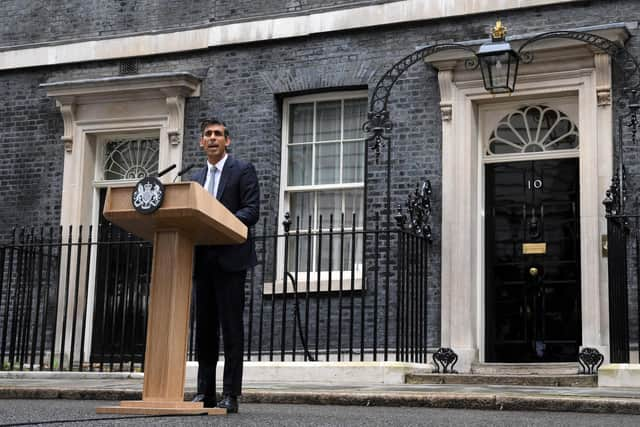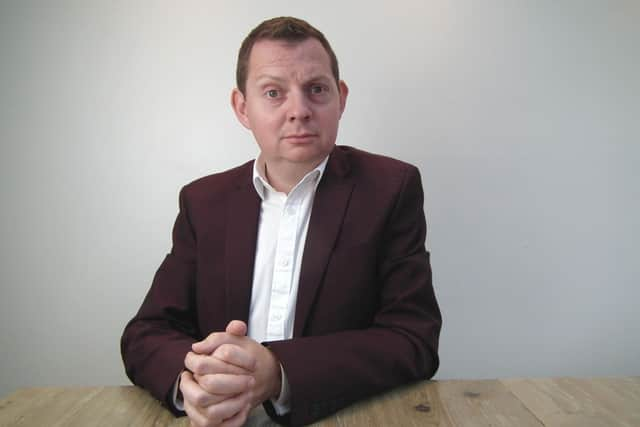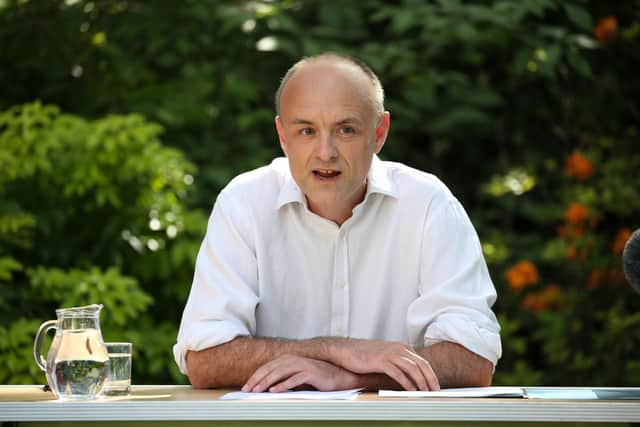Tennants auction house in Leyburn, Scarborough's Peasholm Park and Pontefract's Gillygate: Matt Chorley reveals curious tales in Planes, Trains and Toilet Doors: 50 Places That Changed British Politics
That’s because, despite the common parlance, MPs cannot technically resign.
In his new book, political journalist and comic Matt Chorley reminds us that rules dating back to 1624 ban it - so in a sticky situation, the only recourse to one’s removal is expulsion, a recall petition, disqualification or death.
Advertisement
Hide AdAdvertisement
Hide AdOf these, disqualification is perhaps the most savoury. And our representatives can achieve this by accepting an office which is at odds with being an MP – one paid by the Crown, as members of an independent Parliament cannot be seen to be taking money from the monarch.


One of two such roles - acceptance of which means a member forfeits their seat in the House Commons - is the ‘Crown Steward and Bailiff of the Manor of Northstead’. An unremarkable site even in 1600, reportedly, it is believed to lie at the bottom of the aforementioned park lake in the North Yorkshire seaside town.
“Politics spins around, everyone in Westminster uses this place,” says Times Radio host Chorley, who explores the bizarre arrangement in Planes, Trains and Toilet Doors: 50 Places That Changed British Politics, “without knowing it’s at the bottom of a lake in Scarborough.”
“And actually, because we've had quite a lot of MPs resigning for various reasons the past year, it’s had pretty heavy use. And I'm pretty sure most of those people briefly responsible for the house at the bottom of the lake in Scarborough, have no idea that that is briefly, nominally their responsibility, not least because most of them resign other things on their minds.”
Advertisement
Hide AdAdvertisement
Hide AdThe Chancellor of the Exchequer appoints an MP to one of these two roles - the other being ‘Crown Steward and Bailiff of the three Chiltern Hundreds of Stoke, Desborough and Burnham’, an old administrative area in Buckinghamshire - which they keep only until another member wants to ‘resign’.


Former Prime Ministers David Cameron and Anthony Eden, Peter Mandelson, Robert Kilroy-Silk, John Bercow, David Miliband, Martin McGuinness and Enoch Powell have each been responsible for ‘Northstead’, but it is the former Tamforth MP, Chris Pincher, who is now its symbolic key-holder.
Another ex-PM, Boris Johnson, incidentally, has enjoyed custody of both manors - a rarefied feat.
Chorley’s book – incredibly illustrated by Morten Mørland – is teeming with examples of these odd scenarios in which unsuspected and amusing locations impact in some way on our national politics.
Advertisement
Hide AdAdvertisement
Hide AdSir Vince Cable’s bath, Sir Tony Blair school friend Nick Ryden’s toilet and a helipad at Don Valley Bowl, for example, all get a mention.


Chorley remembers exactly when the idea for the book presented itself. “It was early last year. English Heritage put out a press release saying the number of visitors to Barnard Castle was up 20 per cent on pre-pandemic levels.”
Mr Johnson’s former chief advisor Dominic Cummings famously drove from London to near the County Durham attraction during lockdown restrictions to, as he put it, test his eyesight.
Chorley adds: “So on the radio show, I started talking about what other other slightly obscure places would a tour of political nerds take take in?”
Advertisement
Hide AdAdvertisement
Hide AdIn the book that followed, subaquatic manor houses are not the only Yorkshire locations included which have been pivotal to what goes on in Westminster.
The current premier, Rishi Sunak, is of course MP for Richmond in North Yorkshire and Chorley particularly likes a story associated with Tennants auction house in Leyburn.
In October 2014, it was where locals voted to install Mr Sunak - instead of others including Richmond Tory stalwart Wendy Morton - as the next Conservative candidate for MP when William Hague stepped down.
Years later, writes Chorley, “Morton played a part in her rival’s rise to the top”.
Advertisement
Hide AdAdvertisement
Hide AdAfter becoming Conservative MP for Aldridge-Brownhills in 2015, she was promoted to chief whip during Liz Truss’s brief time as Prime Minister last year. However, in the dying hours of Truss’s tenure, when members of her Government were departing at rapid pace, Jacob Rees-Mogg admitted on Sky News that he was “not entirely clear” whether Morton herself had quit - but given the untenable situation, the Prime Minister did so the next day, October 20. leaving the No 10 Downing Street door open for Mr Sunak.
Chorley likes this anecdote because it’s a “story that captures a thing that happens in politics all the time,” he says, “where slightly peculiar meetings of slightly peculiar people decide the direction of the country potentially for decades to come just by who they select as a candidate in their seat”.
Then there is Pontefract. The first secret ballot was held in the West Yorkshire town in August 1872, when Hugh Childers, the incumbent Liberal MP, successfully defended his seat against Conservative John Savile in a (now abolished) ministerial by-election.
"They were still slightly struggling with the arrangements,” says Chorley, 41, of Fleet in Hampshire. “As we do now, the schools were closed, they used schools as polling stations and at Gillygate in Pontefract they had this little school there but they weren’t happy because the people coming out who’d voted were going to meet the people going in.” For the new secret ballot to work, it was believed, waiting voters should not be influenced by those leaving.
Advertisement
Hide AdAdvertisement
Hide Ad"They took the window out and put wooden boards up to the windowsill, so people who’d voted then had to climb out the window and run down the wooden boards.
"The Times report on this described: ‘The voter, full of grave and serious thoughts at having assisted at so important an experiment, found himself involuntarily running with an ever-increasing impetus down a steep incline on a spring board which would have enabled a professional gymnast to clear the school wall with the greatest ease.’”
A different kind of example, perhaps, in the long political tradition of defenestration.
- Planes, Trains and Toilet Doors: 50 Places That Changed British Politics, published by William Collins, is out now.